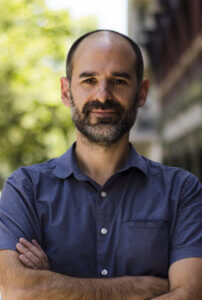
Edge Prize 2021: Sebastian Ureta
The Edge Prize winner is Sebastián Ureta for his article Ruination Science: Producing Knowledge from a Toxic World, published in Science, Technology & Human Values, https://doi.org/10.1177%2F0162243919900957. The Prize Committee members included Pablo Kreimer (chair), Chihyung Jeon, Bryn E. Seabrook, Misria Shaik Ali, and Knut Sorensen.

Indeed, the concept of ruination science is a very promising one and it can be a practice, as well as an agenda relevant to various countries and sites that are generating, experiencing, or ignoring ruination. As a method for analysis and engagement, ruination science can be taken up for many scientific disciplines and environmental/political contexts.
Acceptance statement
I accept the David Edge Prize humbly and heart fully thank the members of the selection committee. This paper would have never been possible without the generosity of the scientists working at the Centro Nacional del Medio Ambiente (CENMA) in Santiago, Chile, who allowed me to witness their daily struggles to produce regulatory environmental knowledge under very challenging institutional circumstances. I wish to dedicate this prize to all the scientists, activists and public officials on the global south who, creatively and stubbornly – and sometimes at great personal costs –, persist on producing science for the public good on these troubling times.
Bio
Sebastian Ureta is an associate professor at Departamento de Sociología, Universidad Alberto Hurtado (Santiago, Chile). His main research interest is the study of the multiple frictions and overflows produced by attempts to manage and regulate industrial waste in Chile, especially the one produced by mining. In 2022 the University of California Press will publish his new book, coauthored with Patricio Flores, Worlds of Gray and Green: Mineral extraction as ecological practice.
